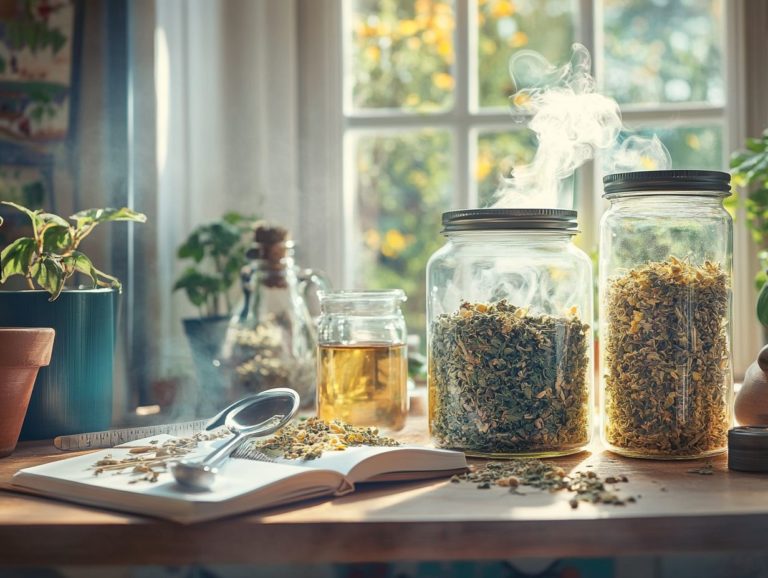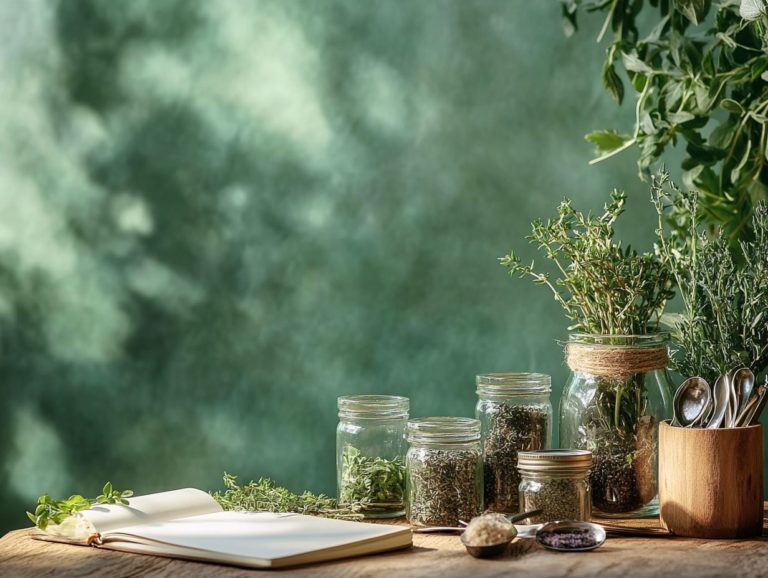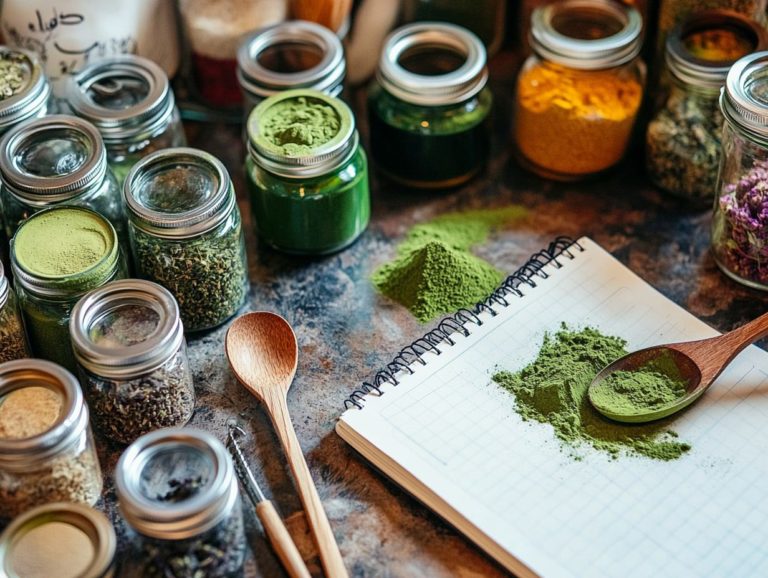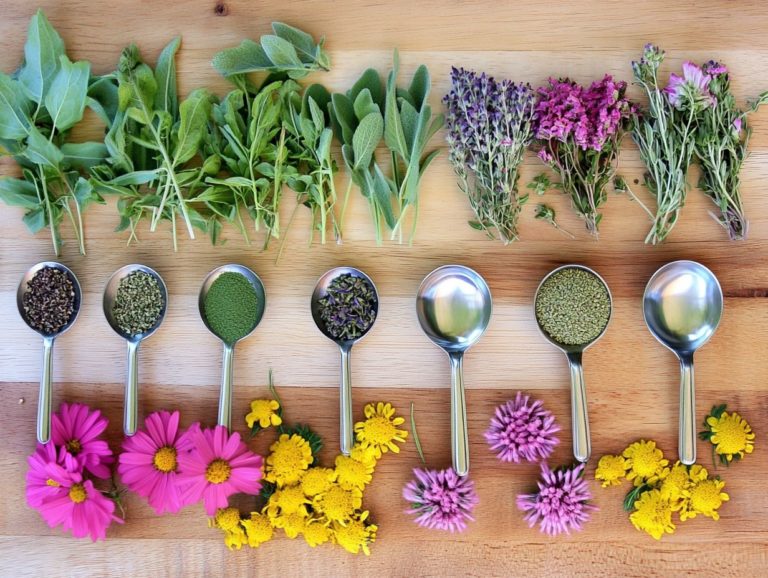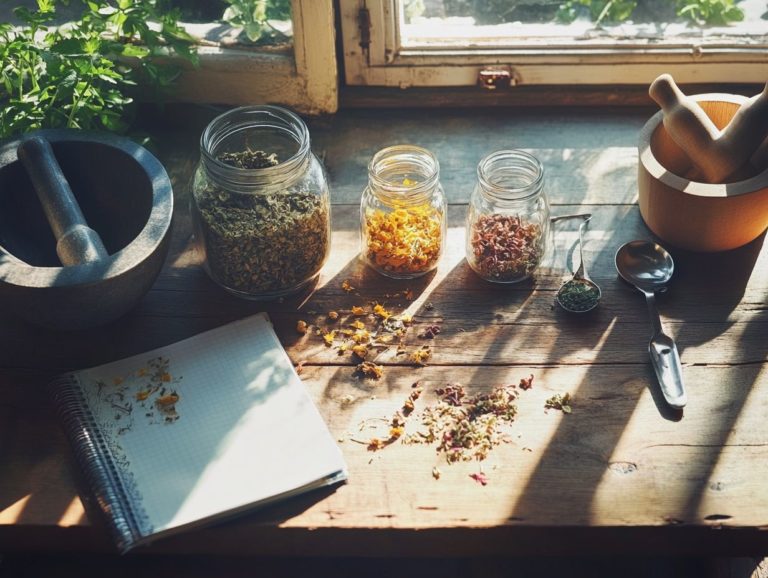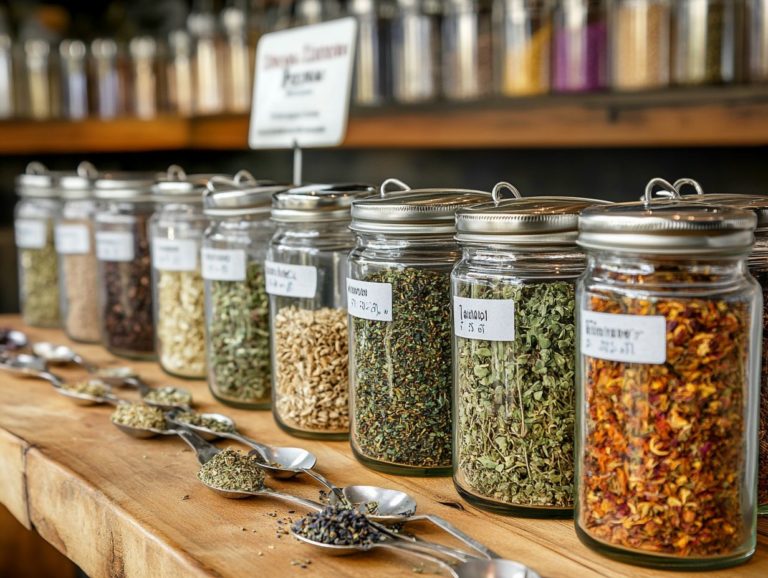Herbal Safety for Kids: What Parents Should Know
Navigating the realm of children’s health can feel overwhelming, particularly when it comes to exploring herbal remedies. While these natural alternatives may offer certain benefits, grasping their safety is paramount.
This article delves into the world of herbal remedies, showcasing common herbs used for children, their advantages, potential risks, and the essential precautions you should take. It also compares herbal options with traditional medicine, emphasizing the importance of consulting healthcare professionals.
Empower yourself with the knowledge you need to make informed choices for your child’s health.
Contents
- Key Takeaways:
- Why Herbal Safety Matters for Your Kids
- Common Herbs Used for Children
- Precautions for Using Herbs with Kids
- Alternative Options for Children’s Health
- Consulting with a Healthcare Professional
- Frequently Asked Questions
- What is considered herbal safety for kids, especially in relation to chronic illness?
- Why should parents be concerned about herbal safety for kids?
- Can all herbs be safely used for kids?
- What are the recommended precautions for herbal safety for kids?
- How can parents ensure herbal safety for kids?
- What are some common herbs that are generally safe for kids?
Key Takeaways:

- Herbal remedies can be beneficial for children, but parents must understand their safety and potential risks.
- Commonly used herbs for children, such as chamomile and ginger, offer benefits but may also have interactions or side effects.
- When using herbal remedies with kids, always follow safe dosages and consult with a healthcare professional to ensure their safety and effectiveness.
Why Herbal Safety Matters for Your Kids
Understanding herbal safety for children is crucial. As parents increasingly look for natural alternatives to conventional medicine for managing various health conditions, it’s essential to prioritize safety, appropriate dosages, and potential side effects.
Consulting with pediatricians about herbal usage can ensure that your children receive the safest supplements available, especially when addressing ongoing health problems or enhancing their immune systems. For more information on safe practices, consider these 5 essential tips for safe herbal use. It’s also important to follow FDA guidelines for consumer safety.
What are Herbal Remedies?
Herbal remedies are natural products derived from plants, and they’ve been used for centuries to support health and wellness. It’s no wonder they ve become popular dietary supplements for various ailments.
These remedies have a rich history, tracing back to ancient civilizations that relied on them in traditional medicine for numerous health concerns. Today, they fit into modern health approaches, attracting those who seek alternative or complementary therapies alongside conventional medicine.
Take echinacea, for example; it’s often the choice to boost the immune system. Or consider valerian root, favored for its calming effects, helping manage stress and sleep disturbances. These herbal supplements exemplify how you can harness plant-based solutions to enhance your overall well-being in a health-conscious society.
Why is Herbal Safety Important for Kids?
Herbal safety is paramount for children. Many parents turn to these natural remedies for managing health conditions and should know about the possible side effects and the correct dosages.
Children s developing bodies can be particularly sensitive to herbs, and their reactions may differ significantly from those of adults. Products made for adults often lack sufficient research on pediatric use, potentially putting your little ones at risk.
Always consult with a pediatrician before giving your child any herbal remedy! This is an essential step to ensure that what you re considering is both safe and appropriate.
Being informed about regulatory standards can also protect your children, as not every herbal product undergoes the same rigorous testing as pharmaceutical drugs. By adopting a cautious approach and prioritizing expert advice on safety in herbal medicine, you can make informed decisions that support your child’s health while minimizing unnecessary risks.
Common Herbs Used for Children

When considering herbal remedies for children, you might find Echinacea, St. John’s Wort, Garlic, and Ginger among the most common choices. Each of these herbs has distinct properties that can enhance a child’s health, especially for those with ongoing health issues or in need of immune system support.
Start your journey to better health for your child by exploring herbal remedies safely today!
Benefits and Risks of Popular Herbs
While popular herbs like Echinacea and St. John’s wort offer benefits like enhanced immune function and mood support, it’s crucial to consider their potential side effects.
Take Echinacea, for example. It’s celebrated for its immune-boosting properties, especially during cold and flu seasons. However, it may trigger allergic reactions in some individuals, particularly those sensitive to daisies. Its interaction with immunosuppressive medications medications that weaken the immune system can also pose risks for certain health conditions.
On the other hand, St. John’s wort is frequently used to alleviate mild to moderate depression due to its influence on serotonin levels. But be cautious it can interact with a range of prescriptions, including antidepressants, birth control pills, and anticoagulants, increasing the risk of adverse effects.
Understanding these nuances is essential for anyone considering the integration of herbal remedies into their health regimen.
Precautions for Using Herbs with Kids
When using herbal remedies for children, exercising caution is vital. Ensure you are informed about safety guidelines, appropriate dosages, and quality control measures that prioritize consumer safety.
Safe Dosages and Interactions
Determining safe dosages for herbal remedies is crucial for children, as improper use can lead to adverse interactions and serious health risks. Always seek guidance from pediatricians.
A child’s age, weight, and overall health condition greatly influence how their body absorbs and reacts to natural substances. The pediatrician’s expertise is invaluable as they evaluate each child’s needs to ensure that any herbal treatments are both appropriate and effective. For guidance on safe usage, refer to herbal remedies safe dosage for adults and children.
Some herbs can also interact with prescribed medications, which can lead to unexpected outcomes. This interaction highlights the need for open communication between parents and healthcare providers, such as the American Academy of Pediatrics, to ensure safety. Incorporating 5 herbal teas for kids’ health can be part of a holistic approach. Coordinating all aspects of a child’s treatment helps optimize safety and promote overall wellness.
Alternative Options for Children’s Health

When considering children’s health, exploring alternative options like herbal remedies can beautifully complement traditional medicine. This approach opens up exciting options for dietary supplements to support your child’s well-being, enriching their health journey with thoughtful choices.
Comparing Herbal Remedies with Traditional Medicine
Comparing herbal remedies to traditional medicine reveals distinct philosophies regarding treatment efficacy, safety, and the choice between natural products and pharmaceuticals.
Herbal solutions often draw on centuries-old traditions and holistic healing practices, while traditional medicine relies on evidence-based protocols supported by rigorous scientific research. The regulatory landscape of these approaches differs significantly; traditional pharmaceuticals go through strict testing before reaching the market, whereas herbal products often face less oversight. To ensure safety in usage, it’s important to follow herbal safety guidelines, leading to variability in quality and potency.
Regarding safety profiles, documentation for natural substances may not be as comprehensive, making it essential to consult healthcare providers. This step ensures informed decisions, especially concerning potential interactions with prescribed medications or underlying health conditions. Additionally, referring to herbal safety guidelines can provide valuable dosage information.
Consulting with a Healthcare Professional
Consulting with a healthcare professional is crucial for any parent contemplating herbal remedies for their children. Pediatricians offer invaluable insights tailored to individual needs, ensuring both safety and appropriate usage.
Your child’s health deserves this level of attention and expertise.
When to Seek Medical Advice
Understanding herbal remedies is key for parents! Your child’s health is priceless, so knowing when to seek advice is vital, especially if your child is experiencing unusual side effects or has pre-existing health conditions.
While you might think that natural products, like valerian and zinc, are always safe, it’s important to know that some herbs can interact negatively with other medications or worsen underlying health issues, such as Reye syndrome. To ensure safety, consider following creating herbal remedies safety tips. Stay alert for signs like unexpected behavioral changes, gastrointestinal discomfort, or any allergic reactions. These may suggest that the herbal approach isn’t the best fit for your child.
If your child continues to show symptoms despite herbal treatment, it s imperative to consult a healthcare professional for guidance.
Prioritize your child’s wellness. This ensures natural remedies support their health safely and effectively.
Frequently Asked Questions

What is considered herbal safety for kids, especially in relation to chronic illness?
Herbal safety for kids refers to the proper and safe usage of herbal remedies and supplements for children. It involves understanding the potential risks and benefits of using herbs, as well as following recommended dosages and precautions.
Why should parents be concerned about herbal safety for kids?
Parents should be concerned about herbal safety for kids because children’s bodies are still developing and may react differently to herbs compared to adults. Some herbs can interact with medications or cause side effects, like Reye syndrome, which can harm children.
Can all herbs be safely used for kids?
No, not all herbs are safe for children. Some herbs may be too potent or have potential side effects that could be harmful. It is important to do thorough research and consult with a healthcare professional or a pediatrician before giving any herbs to kids, especially if they have chronic illnesses.
What are the recommended precautions for herbal safety for kids?
Parents should always read and follow recommended dosages and instructions when giving herbs to kids. It is also important to purchase herbs from reputable sources and avoid self-medicating without consulting a healthcare professional first.
How can parents ensure herbal safety for kids?
To ensure herbal safety for kids, parents should educate themselves about the potential risks and benefits of herbs, including dietary supplements like melatonin and omega-3 fatty acids. They should do thorough research and consult with a healthcare professional before giving any herbs to their children. Keep a close eye on your child after giving herbs. If anything seems off, stop immediately and consult a professional!
What are some common herbs that are generally safe for kids?
Some common herbs that are generally considered safe for kids include chamomile, ginger, garlic, peppermint, and echinacea, which can support the immune system. However, it is important to consult with a healthcare professional before giving any herbs to children, as individual reactions may vary.

